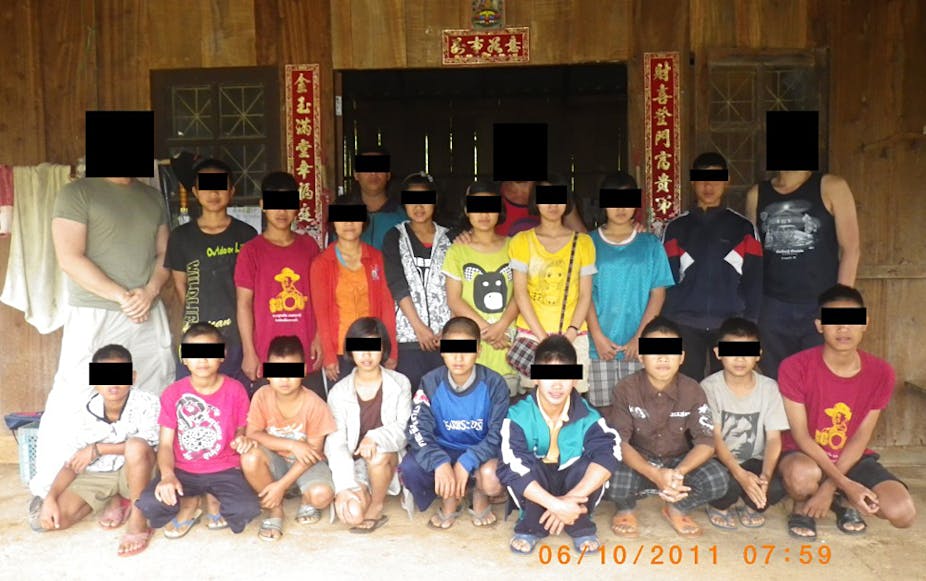Alarm was raised this week when it emerged that Bernard McGrath, a former Catholic brother sought in Australia over 252 child sex charges, was able to leave New Zealand for Sri Lanka ahead of an extradition order.
The order had been delayed for some months and this created a window of opportunity for McGrath to flee. He has reportedly spent much of 2012 living on a tea plantation in the Sri Lankan highlands. His alleged victims in Australia raised concerns that he posed a considerable risk to children there.
Following international media attention, McGrath flew back to New Zealand this week to appear in court over the extradition order. He had previously been jailed in New Zealand in 2006 for five years for sexually abusing boys but he was paroled in 2008.
There is something deeply unsettling about the notion of a convicted sexual abuser fleeing to south-east Asia to avoid further charges. It has been reported that “organised child-sex rings” operate throughout Sri Lanka. This follows on from the recent arrests in Thailand of two Australian men charged with sexual offences against local children.
The vulnerability of children in the region to abuse by Australian men is well recognised. In 1994, Australia criminalised a range of sexual activities with children by Australians in jurisdictions outside Australia. This legislation was designed to deter offenders and also to support the policing of sexual abuse in other countries.
Recent changes in 2010 broadened the definition of sexual activity and increased penalties. The authorities have taken a more pre-emptive approach by targeting “grooming” behaviours and attempting to intervene in the “planning” stages of sex tourism.
Campaigns against child sex trafficking, exploitation and slavery tend to use poignant images of children that play on Western ideas of childhood “innocence”. The clear message is that the problem of sexual exploitation will be solved if children are protected from predatory paedophiles.
However this belies the complex situation faced by impoverished children and families in developing countries. Widespread rural poverty, low wages and limited education can force children into sexual exploitation. Professor Julia O’Connell Davidson suggests that other forms of subsistence living are so degrading that sexual exploitation can be seen as preferable by children and their families.
It also overlooks the role that developed countries play in promoting consumerism and economic policies that exacerbate the vulnerability of children in developing countries. Macro-economic reforms that reduce social and welfare spending can remove safety nets for poor children.
Meanwhile, the promotion of tourism for economic growth in developing nations introduces large numbers of Westerners into countries that may have less formal protections for children or where organised crime runs much of the sex industry. For some Western tourists, paying for sex with minors as well as adults can be part of their “consumer” experience as empowered wealthy foreigners.
This is a “market” catered for by sexually abusive networks that can flourish relatively openly in developing countries with limited regulation and policing.
The issue of child sexual exploitation is therefore one of both demand and supply: the willingness of Australian men to seek out minors for abuse while overseas, as well as the constrained choices facing children in those countries.
Legislation in Australia can address demand. The available evidence suggests that Australia is active in preventing and policing sexual abuse by Australians overseas, and in helping police forces in the region to do so.
However the issue of supply is more complicated. It speaks to the powerlessness of children in a globalised world, and the social impacts of economic reforms pushed by Western powers in the name of development and growth.
It is also important to recognise sexual exploitation and “sex for favours” amongst vulnerable minors in Australia. Child prostitution is usually seen as a problem for “other” nations, but public inquiries in Australia and overseas find vulnerable teenagers swapping sex for paltry amounts of money, alcohol and drugs.
Many of these children are in out-of-home care and their sexual exploitation is often known to the authorities at the time. These underage teenagers, like their counterparts in developed countries, face limited opportunities for financial or emotional support. They may accept this support when it is offered by adult men in exchange for sex.
Men such as McGrath become lightning rods for community disgust at sexual exploitation and abuse. Increased international cooperation can limit opportunities for such abusers to “slip through the net”.
However the issue of sexual exploitation will not be solved by policing alone. Instead measures must be taken to address the broader social and economic issues that underpin children’s vulnerability to abuse and this raises uncomfortable questions about the conditions of children in Australia and abroad.

